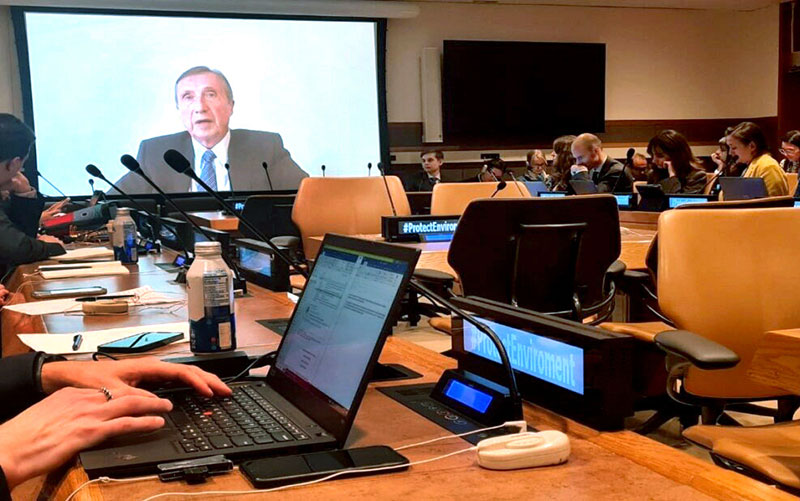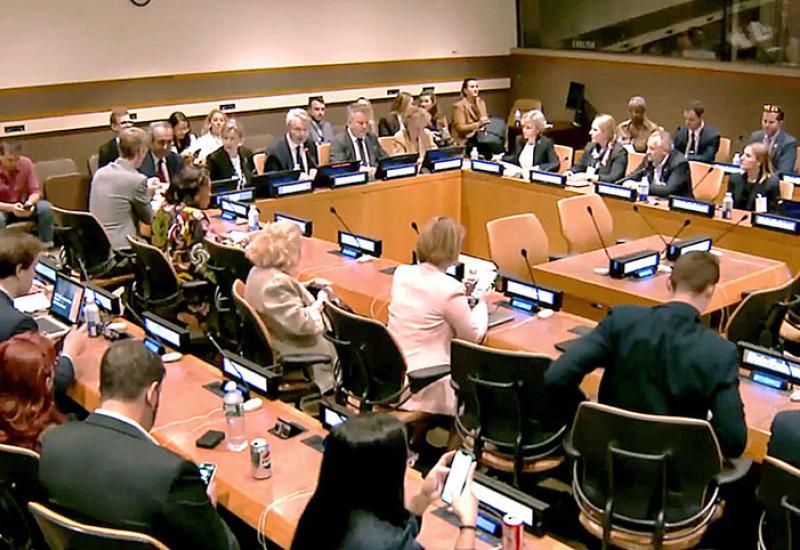The issues raised at the forum and in its Declaration were also discussed at the seminar “Environmental Security during War and Armed Conflict” held on November 6, 2024, at the UN Headquarters and dedicated to the International Day for the Prevention of Environmental Exploitation during War and Armed Conflict. It focused on the environmental consequences of the war in Ukraine.
💥
The seminar brought together government officials and public figures from more than 20 countries. The participants discussed the extent of the environmental damage caused to Ukraine; raising international awareness of the regional and global consequences of the Russian-Ukrainian war; ways to draw attention to the need for legal assessment of environmental damage and organize measures to compensate for it and bring those responsible to justice; stimulating global cooperation to protect the environment during armed conflicts; and, so to speak, receiving firsthand information about Ukraine's efforts to restore the environment with the support of the United Nations Environment Programme.
The moderator of the event, Pekka Haavisto, Member of Parliament and former Minister of Foreign Affairs of Finland, gave numerous examples of the devastating effects of war on nature in Syria, Afghanistan, Liberia, Sudan and other regions of the world and emphasized the importance of joining forces to implement paragraph 8 of the Ukrainian Peace Formula (which refers to the key areas of ensuring environmental safety and counteracting the environmental consequences of war - KP's note). He emphasized that the international community should help Ukraine assess the damage caused, develop response measures, legally assess and record cases of environmental crimes for further compensation and prosecution, and restore the environment through reclamation, demining, reforestation, creation of protected areas and water purification. He also emphasized that environmental security requires coordinated efforts of states, international organizations and society for sustainable restoration and protection of nature, which will ensure peace and prosperity for future generations.
The global environmental consequences of the war in Ukraine were discussed at the seminar by Sergiy Kyslytsya, Permanent Representative of Ukraine to the UN, and Elina Kalkku, Permanent Representative of Finland to the UN. In his speech, Sergiy Kyslytsya cited impressive statistics: in 2024 alone, fires destroyed more than 24,000 hectares of forest in Ukraine, causing 180 million tons of CO2 emissions - the equivalent of the annual operation of more than 90 million cars - which threatens not only Ukraine but also other countries due to the transboundary nature of these threats. Therefore, he called on the international community to actively support Ukraine in restoring the environment by providing assistance and conducting a legal assessment of damages.
According to Svitlana Hrynchuk, Minister of Environmental Protection and Natural Resources of Ukraine, who also spoke at the seminar, Europe's environmental security is now inextricably linked to its military security. This is confirmed by Ukraine's experience and the registration of environmental damage: as a result of military operations, its natural environment has suffered damage in excess of USD 71 billion. After all, more than 10,000 missiles were fired at infrastructure, including energy facilities and residential buildings, and in October 2024 alone, the Russians launched 2,000 drones at these facilities. She also cited numerous evidence of the destruction of nature in the occupied territories - from the illegal use of soil to the removal of animals from the Askania Nova reserve. Svitlana Hrynchuk emphasized that Ukraine, acting in accordance with the eighth point of the Ukrainian peace formula, is doing everything possible to overcome the environmental consequences of the war, including land cleanup, forest restoration and the creation of nature protection zones.
The Minister of Climate and Environment of Finland, Kai Mukkänen, spoke in support of his Ukrainian counterpart, emphasizing that Ukraine is defending its right to exist as a sovereign nation and, at the same time, fighting against colonialism on behalf of the entire democratic world. He also informed about his joint work with Svitlana Hrynchuk at the international conference on environmental security held in Helsinki on October 19, 2024, which identified four key aspects of this problem: assessing the damage and destruction of Ukraine's natural environment, ensuring accountability for the damage caused, restoring the environment damaged by war, and increasing resilience to climate change and environmental disasters in the future.
Dr. Jamil Ahmad, Director of the United Nations Environment Program (UNEP), spoke about the role of the UN in monitoring the environmental consequences of war. He spoke about research on the impact of military conflicts on the environment in different countries, including Ukraine, and the consequences of the Kakhovka hydroelectric dam explosion.
She also spoke about the action platform for the “green recovery” of Ukraine, prepared jointly by the German Ministry of the Environment, the OECD and the UN Economic Commission for Europe, presented at the conference on the restoration of Ukraine in Berlin (June 11-12, 2024). Dr. Christina K. Durbak, founder and chairman of the international organization World Information Transfer, emphasized that the environmental crimes committed by Russia in Ukraine are not isolated incidents - they became possible due to the indifference of international law and institutions. And that, according to Article 7 of the International Criminal Court, which deals with environmental destruction, the consequences of these actions constitute crimes against humanity, so only a change in the attitude of the international community and united efforts to help Ukraine can stop this destructive process.
The speech of Viviane Occhacaque, Director General of the International Atomic Energy Agency (IAEA) Office in New York, was filled with concern: she drew attention to the risks associated with nuclear energy in the conflict zone, especially given the situation at the Zaporizhzhia NPP. She also said that IAEA Director General Rafael Mariano Grossi offered President of Ukraine Volodymyr Zelenskyy an assistance program that is usually provided to countries after natural disasters and accidents (such assistance was provided to Peru in 2022 to clean up large areas after an oil spill, as well as to Turkey and Syria in 2023 after a 7.8-magnitude earthquake). The first stage of assistance to Ukraine included 2.7 million euros, but in September 2024 its volume was increased by another 65%, and now new opportunities to support Ukraine in the event of nuclear disasters that may arise due to the war are being explored.

On behalf of the Ukrainian Peace Council and the Environmental Security Council, Mykhailo Zgurovsky, Chairman of the Ukrainian Peace Council, Academician of the National Academy of Sciences of Ukraine, Professor of Igor Sikorsky Kyiv Polytechnic Institute, appealed online to the international community to pay attention to the scale of environmental destruction in Ukraine, the consequences of which go far beyond the country and pose serious environmental, food and nuclear threats to the whole world. He emphasized that since the beginning of the war in 2014, and especially after the full-scale invasion in 2022, more than 300 thousand hectares of Ukrainian land have been polluted. One of the most serious threats was the mining of more than 170,000 square kilometers of Ukrainian territory, about 28% of the country's total area. Not only did the mining put significant areas of arable land out of use, but it also exacerbated the global food crisis, especially in countries dependent on Ukrainian grain exports. The destruction of more than 500,000 hectares of forests and protected areas has led to a significant loss of biodiversity and increased greenhouse gas emissions, which negatively affects global climate stability. The explosion of the Kakhovka hydroelectric power plant in 2023 caused the flooding of more than 100,000 hectares of land, leaving about a million people without access to drinking water. This has created a threat of cross-border water and air pollution, which is already affecting Poland and Hungary. The occupation of the Zaporizhzhia NPP, shelling and power outages pose an unprecedented risk of a nuclear disaster, the consequences of which will have a devastating impact on the health, economy and environment of the entire continent. Mykhailo Zgurovsky emphasized that the war is causing irreparable damage to the health of Ukrainians, and that is why the Ukrainian Peace Council has launched the Peace and Healthy Ukraine program, which focuses on providing psychological assistance to wounded soldiers, veterans and IDPs. Mykhailo Zgurovsky also said that thanks to a successful Ukrainian startup, the Rozvova platform, more than 750 professional psychologists are already providing support to the victims. In conclusion, he called on the international community to take decisive and joint action to put an end to this war, which not only destroys nations but also threatens the ecological stability of the planet.
Brittany Roser, Advocacy Advisor at PAX (Netherlands), pointed out the need to document the damage caused in order to understand specific environmental risks, respond promptly and take mitigation measures, as well as to establish responsibility for environmental damage (damage registry and proceedings at the International Criminal Court) and raise awareness in the field of international policy on the environmental aspects of armed conflict and ecocide, etc.
In the final discussion, representatives of Bulgaria, the Netherlands, Lithuania, France, Latvia, and the EU made statements supporting Ukraine in overcoming the environmental consequences of the war and insisting on the need to bring to justice those who cause environmental damage during conflicts.
Summarizing the results of the seminar, Pekka Haavisto emphasized the unanimous support of the international community for paragraph 8 of the Ukrainian Peace Formula, aimed at addressing the environmental consequences of war. He offered to support the activities of the Ministry of Environmental Protection and Natural Resources of Ukraine as a coordinator of joint efforts to protect the environment during the war and stressed the importance of organizing coordinated measures aimed at restoring and protecting the environment of Ukraine, as well as bringing those responsible for the destruction to justice. Only global cooperation and raising environmental awareness can help prevent environmental tragedies and ensure a stable and safe existence for future generations.

